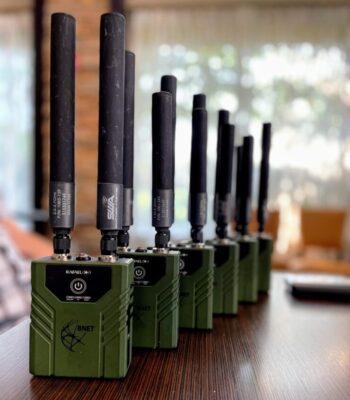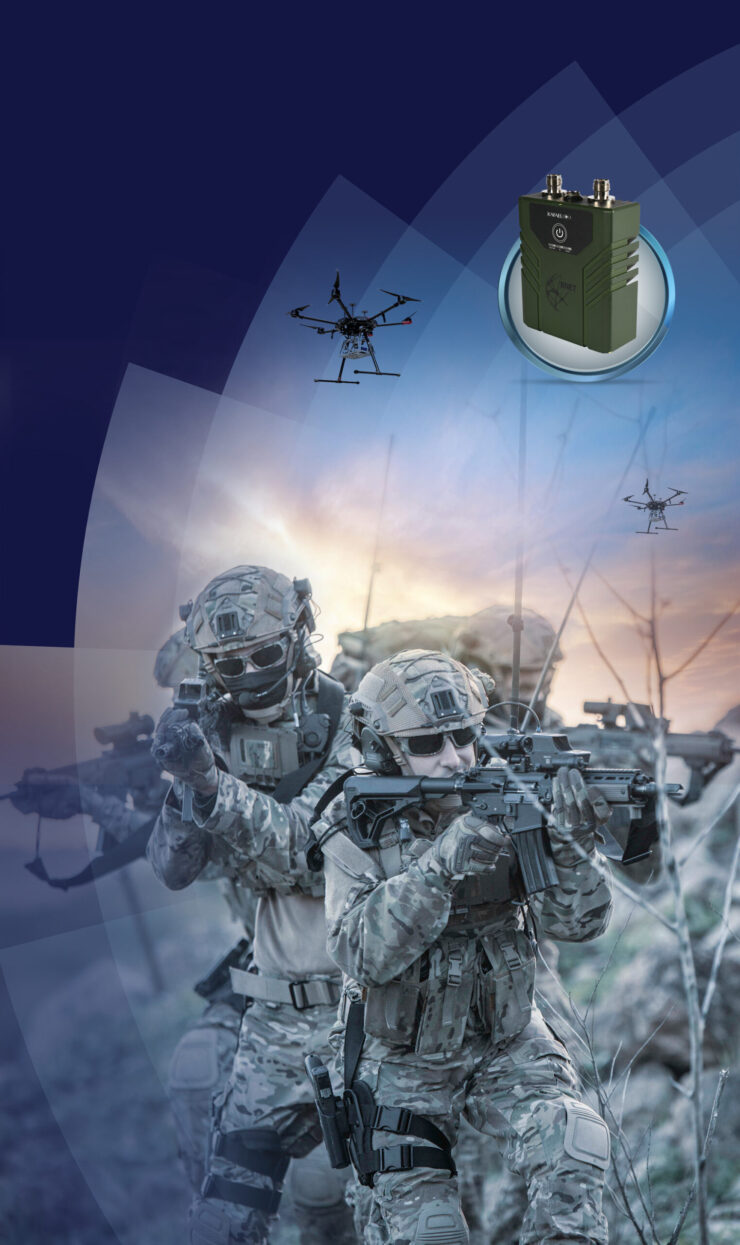
Tel Aviv: The family of the Rafael BNET radio systems is growing. The Israeli company Rafael Advanced Defense Systems Ltd has unveiled its BNET NANO a palm sized systems. BNET NANO brings ground-breaking capabilities to the battlefield, based on Rafael’s game-changing Multi-Channel Reception (MCR) technology, unprecedented network capacity in terms of data rates and number of users, minimal delay, and support for “flat” networks with hundreds of members.
BNET cognitively manages scarce spectrum resources, providing seamless force merge with minimal planning and efficient spectrum usage. The radio works in GPS-denied areas, a growingly typical scenario in today’s battlefield. BNET is able to sense and avoid spectrum interference and operates as a LPI/LPD device in dense environments.
VP, Yoav Wermuth, head of Rafael’s C3I directorate commented: “The BNET NANO radio is a significant advancement to soldiers and platforms that are very weight and power aware. Rafael’s BNET MCR patent has been integrated into a small form factor allowing the operation of several voice groups, data streams and video, all in a single device. The MCR technology breaks the paradigm of a radio that has single channels, and allows the simultaneous reception of dozens of channels.”
Amihai Dekel, BD Director at Rafael’s C3I directorate, added: “Our solution, encapsulated in a box the size of a soldier’s palm is a breakthrough that can address many tactical programs that have previously run into capacity restrictions. This technology finally enables the capacity and connectivity of hundreds of units, without burdening the soldier with several communication boxes that all require SWaP.”
BNET is a lightweight radio unit enabling point-to-point and point-to-multipoint topology and an Ad Hoc Mesh Network, supporting complete brigade area-of operation connectivity with a unique SDR full IP design.
Rafael Advanced Defense Systems has been selected by an Asian air force to equip its fleet of aircraft with the BNET-AR communication solution. The Indian Air Force is equipping its combat aircraft with the BNET system.
According to Rafael, the BNET Family of SDR provides a robust voice and data-link solution and supports simultaneous services of data, voice and video services with multiple auto relays.
The BNET is operational and combat-proven with a number of air forces around the world, featuring a unique, patented software-defined radio and network architecture, delivering wideband communications with low delay and reliable connectivity.
The variant that will be supplied is the BNET – AR, a modular multiband SDR for airborne platforms, integrated on-board fighters and helicopters as well as Ground Control Stations equipped with the same BNET-AR, enabling net-centric operations and real-time situation awareness.
The BNET Family is a Spectrum-Aware SDR – utilizing the spectral arena of the battlefield to the fullest in a cognitive way, thus addressing the challenges of the modern battlefield (e.g. limited spectrum, connecting multiple sensors and shooters, etc.). All this is achieved by BNET-patented technology – Multi-Channel Reception (MCR), which enables it to receive and analyse information from numerous frequency channels, simultaneously, using a single RF head.
 VP Yoav Wermuth, head of Rafael’s C3I directorate said that the new contract strengthens the company’s position as a major supplier of aerial communication systems. He added that the system is highly scalable, and remains robust in the face of the chaos of battle, all the while operating under constant jamming and cyber-attacks”.
VP Yoav Wermuth, head of Rafael’s C3I directorate said that the new contract strengthens the company’s position as a major supplier of aerial communication systems. He added that the system is highly scalable, and remains robust in the face of the chaos of battle, all the while operating under constant jamming and cyber-attacks”.
Earlier this year, the Rafael BNET communications system, has been selected to protect sensitive installations in the US from Electromagnetic Pulse (EMP). A leading US power company has installed a US FCC-certified version of Rafael’s world-class EMP-protected BNET radio in December as part of its EMP protection strategy. This is the first commercial installation of a BNET radio, Rafael’s software-defined cognitive radio with EMP-protections for “Black Sky” Hazards and other potential threats.
A “Black Sky” Hazard is defined as a catastrophic event that severely disrupts the normal functioning of critical infrastructures in multiple regions for long durations. An EMP event can be both human-caused and naturally occurring. In the event of an EMP, re-energizing the power grid and restoring critical infrastructure after a Black Sky event will require a powerful EMP protected communications platform like BNET.
Rafael’s current FCC-approved BNET radio operates on the LMR bands, and can be integrated with other communications platforms, such as a PBX, through the use of SIP, addressing the specific requirements of critical infrastructure.
Rafael Advanced Defense Systems is currently working with its US partner, the EIS Council, to expand the LMR operational range of this radio, as well as to provide the nation’s first EMP-protected broadband radio, due to be approved in 2021.
In late 2020, the local production of the Rafael BNET software defined radio, selected by the Indian Air Force, has begun. The system is manufactured by ARC, a joint venture of Israeli company Rafael and India company Astra Microwave. The facility operates at Hardware Technology Park close to Hyderabad international airport.
The Israeli company will supply 1000 systems that will be integrated into all the Indian air force combat aircraft.
The BNET is the main communication system of the Israeli air force (IAF) existing and future platforms. According to Rafael, the BNET communications system has been selected by the air forces of Brazil and Colombia and is now competing in other countries.








